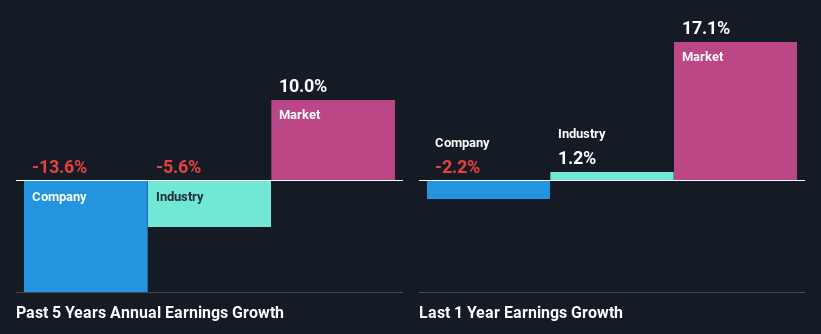The Berkeley Group Holdings plc (LON:BKG) On An Uptrend: Could Fundamentals Be Driving The Stock?
Berkeley Group Holdings' (LON:BKG) stock is up by 8.7% over the past three months. We wonder if and what role the company's financials play in that price change as a company's long-term fundamentals usually dictate market outcomes. Particularly, we will be paying attention to Berkeley Group Holdings' ROE today.
Return on equity or ROE is an important factor to be considered by a shareholder because it tells them how effectively their capital is being reinvested. Put another way, it reveals the company's success at turning shareholder investments into profits.
See our latest analysis for Berkeley Group Holdings
How To Calculate Return On Equity?
ROE can be calculated by using the formula:
Return on Equity = Net Profit (from continuing operations) ÷ Shareholders' Equity
So, based on the above formula, the ROE for Berkeley Group Holdings is:
14% = UK£464m ÷ UK£3.2b (Based on the trailing twelve months to October 2022).
The 'return' is the amount earned after tax over the last twelve months. That means that for every £1 worth of shareholders' equity, the company generated £0.14 in profit.
Why Is ROE Important For Earnings Growth?
We have already established that ROE serves as an efficient profit-generating gauge for a company's future earnings. Based on how much of its profits the company chooses to reinvest or "retain", we are then able to evaluate a company's future ability to generate profits. Generally speaking, other things being equal, firms with a high return on equity and profit retention, have a higher growth rate than firms that don’t share these attributes.
Berkeley Group Holdings' Earnings Growth And 14% ROE
To begin with, Berkeley Group Holdings seems to have a respectable ROE. Especially when compared to the industry average of 10% the company's ROE looks pretty impressive. Needless to say, we are quite surprised to see that Berkeley Group Holdings' net income shrunk at a rate of 14% over the past five years. Based on this, we feel that there might be other reasons which haven't been discussed so far in this article that could be hampering the company's growth. These include low earnings retention or poor allocation of capital.
Furthermore, even when compared to the industry, which has been shrinking its earnings at a rate 5.6% in the same period, we found that Berkeley Group Holdings' performance is pretty disappointing, as it suggests that the company has been shrunk its earnings at a rate faster than the industry.
Earnings growth is an important metric to consider when valuing a stock. What investors need to determine next is if the expected earnings growth, or the lack of it, is already built into the share price. This then helps them determine if the stock is placed for a bright or bleak future. Is Berkeley Group Holdings fairly valued compared to other companies? These 3 valuation measures might help you decide.
Is Berkeley Group Holdings Using Its Retained Earnings Effectively?
Berkeley Group Holdings' low three-year median payout ratio of 5.1% (or a retention ratio of 95%) over the last three years should mean that the company is retaining most of its earnings to fuel its growth but the company's earnings have actually shrunk. The low payout should mean that the company is retaining most of its earnings and consequently, should see some growth. So there might be other factors at play here which could potentially be hampering growth. For instance, the business has faced some headwinds.
Additionally, Berkeley Group Holdings has paid dividends over a period of at least ten years, which means that the company's management is determined to pay dividends even if it means little to no earnings growth. Looking at the current analyst consensus data, we can see that the company's future payout ratio is expected to rise to 85% over the next three years. Accordingly, the expected increase in the payout ratio explains the expected decline in the company's ROE to 10%, over the same period.
Summary
In total, it does look like Berkeley Group Holdings has some positive aspects to its business. Yet, the low earnings growth is a bit concerning, especially given that the company has a high rate of return and is reinvesting ma huge portion of its profits. By the looks of it, there could be some other factors, not necessarily in control of the business, that's preventing growth. With that said, we studied current analyst estimates and discovered that analysts expect the company's earnings growth to improve slightly. This could offer some relief to the company's existing shareholders. Are these analysts expectations based on the broad expectations for the industry, or on the company's fundamentals? Click here to be taken to our analyst's forecasts page for the company.
Have feedback on this article? Concerned about the content? Get in touch with us directly. Alternatively, email editorial-team (at) simplywallst.com.
This article by Simply Wall St is general in nature. We provide commentary based on historical data and analyst forecasts only using an unbiased methodology and our articles are not intended to be financial advice. It does not constitute a recommendation to buy or sell any stock, and does not take account of your objectives, or your financial situation. We aim to bring you long-term focused analysis driven by fundamental data. Note that our analysis may not factor in the latest price-sensitive company announcements or qualitative material. Simply Wall St has no position in any stocks mentioned.
Join A Paid User Research Session
You’ll receive a US$30 Amazon Gift card for 1 hour of your time while helping us build better investing tools for the individual investors like yourself. Sign up here

